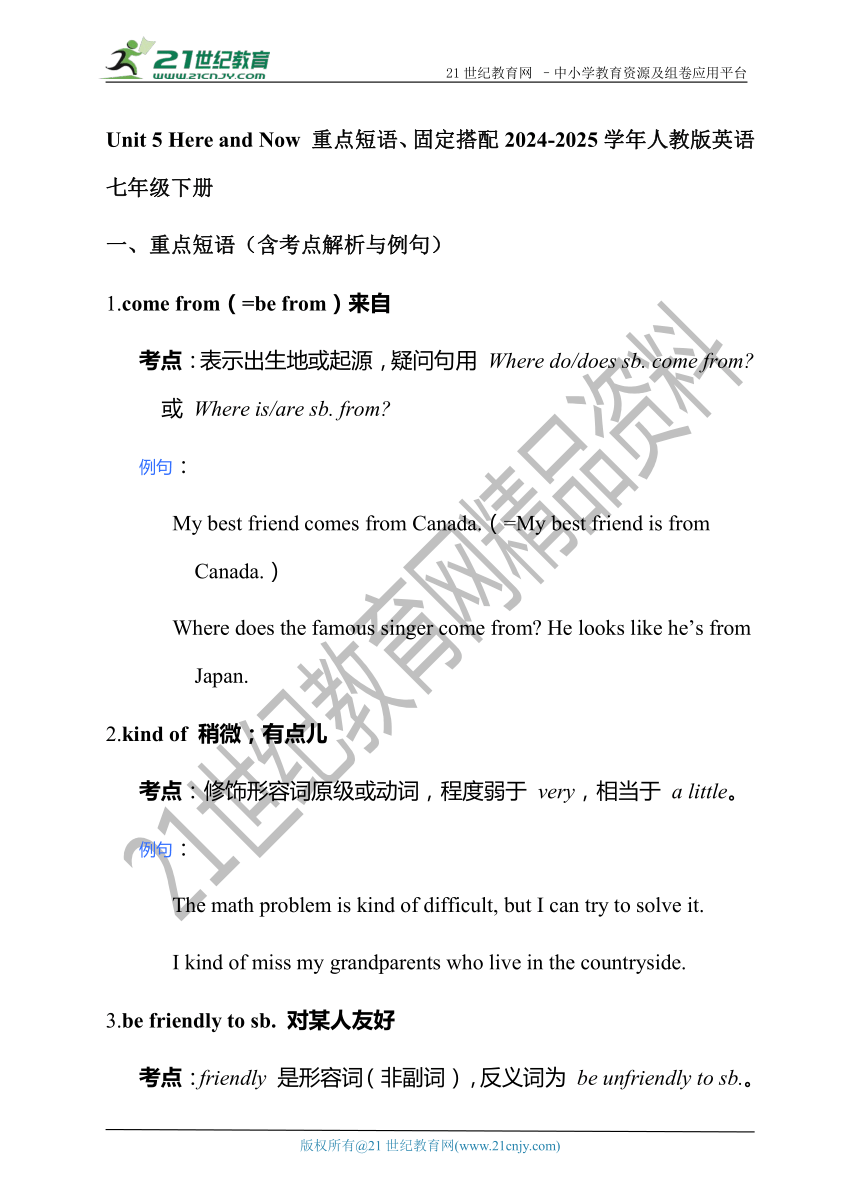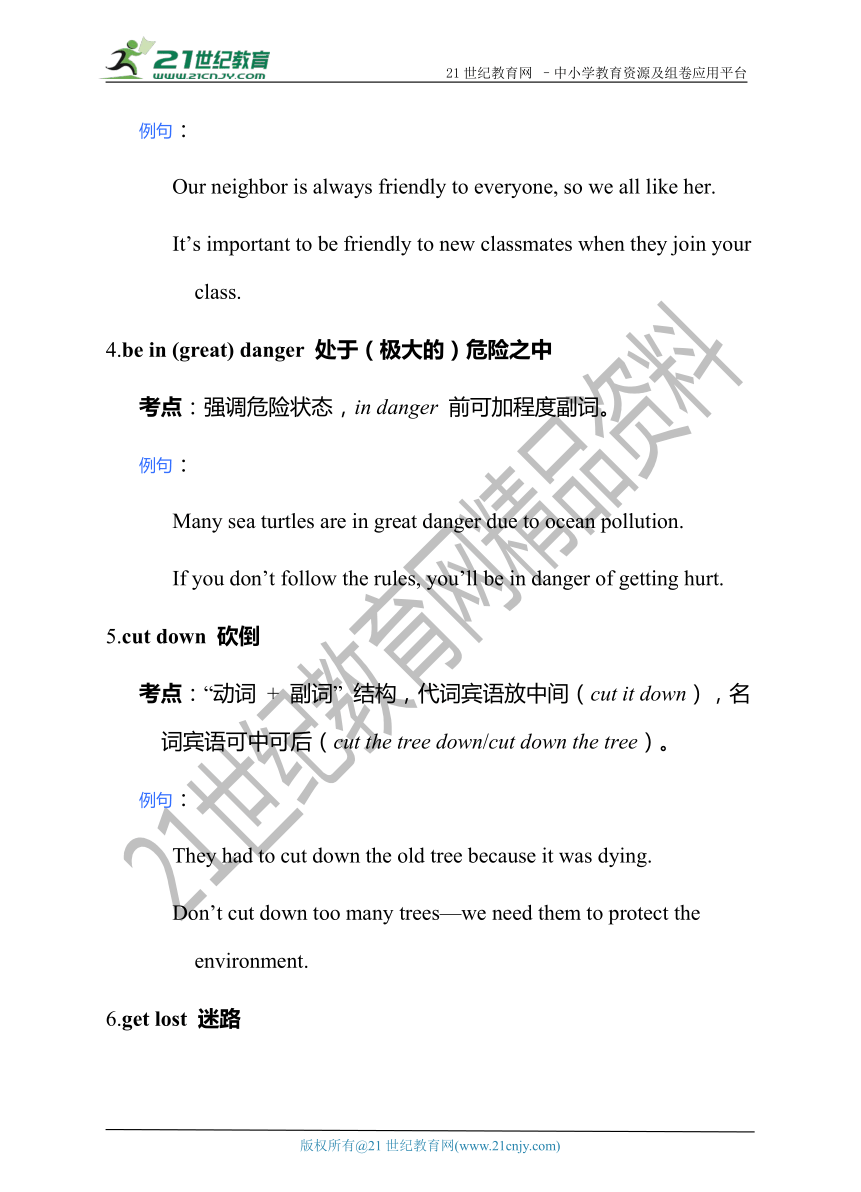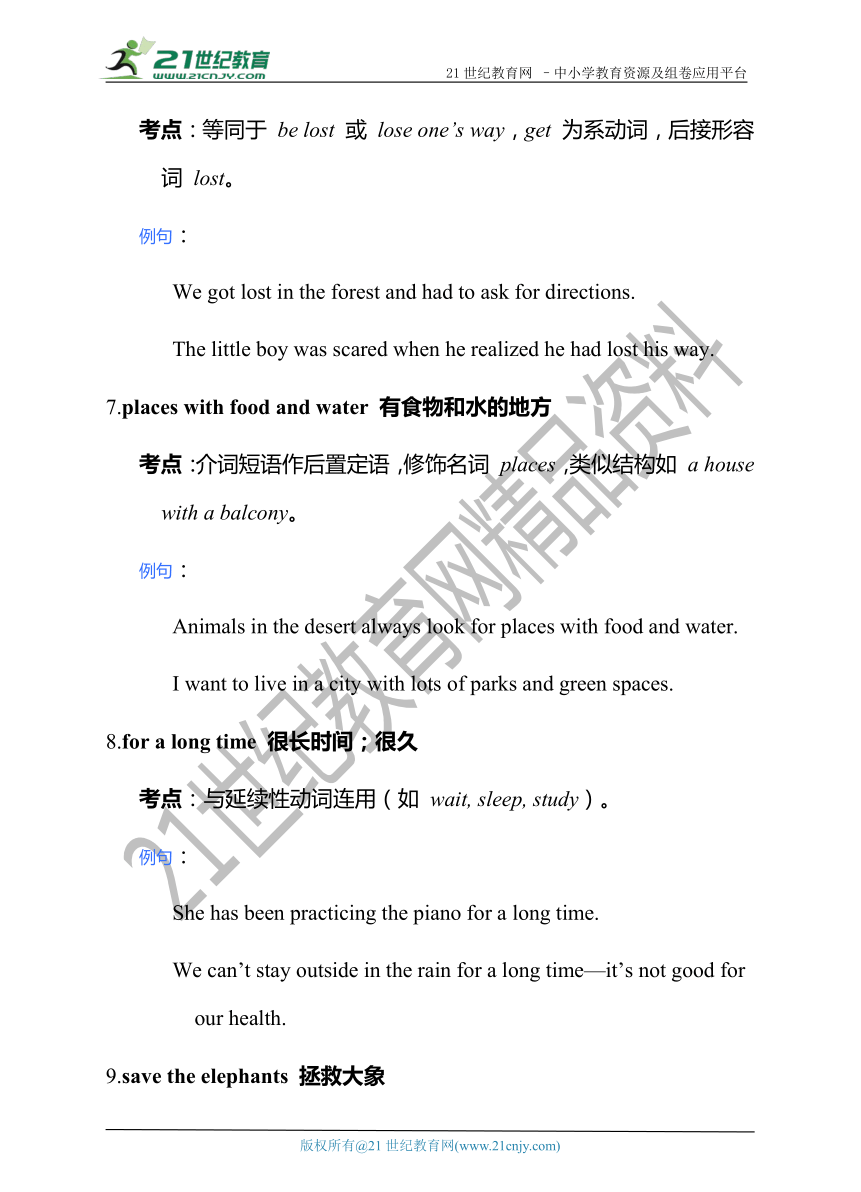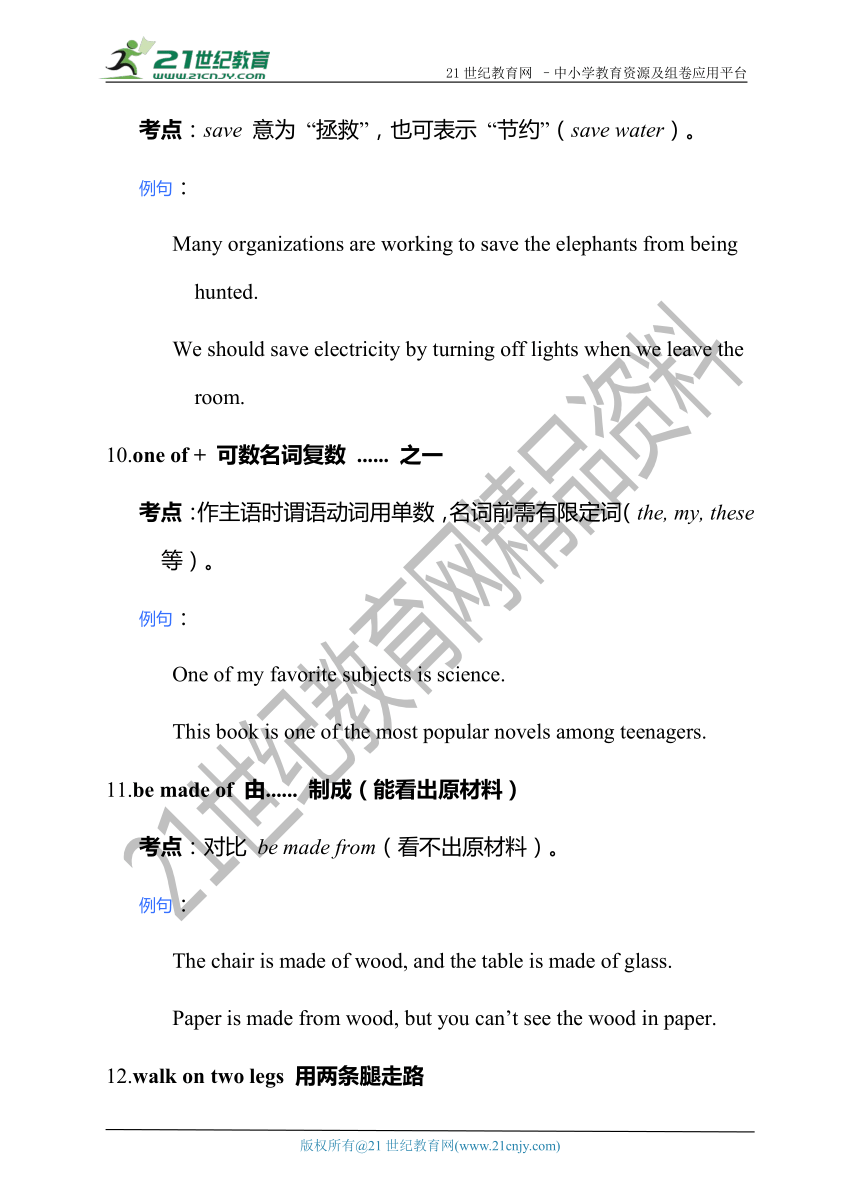Unit 5 Here and Now 重点短语、固定搭配同步学案【2024-2025学年人教版英语七年级下册】
文档属性
| 名称 | Unit 5 Here and Now 重点短语、固定搭配同步学案【2024-2025学年人教版英语七年级下册】 |  | |
| 格式 | docx | ||
| 文件大小 | 50.5KB | ||
| 资源类型 | 试卷 | ||
| 版本资源 | 人教版 | ||
| 科目 | 英语 | ||
| 更新时间 | 2025-04-08 10:29:53 | ||
图片预览




文档简介
21世纪教育网 –中小学教育资源及组卷应用平台
Unit 5 Here and Now 重点短语、固定搭配2024-2025学年人教版英语七年级下册
一、重点短语(含考点解析与例句)
1.come from(=be from)来自
考点:表示出生地或起源,疑问句用 Where do/does e from 或 Where is/are sb. from
例句:
My best friend comes from Canada.(=My best friend is from Canada.)
Where does the famous singer come from He looks like he’s from Japan.
2.kind of 稍微;有点儿
考点:修饰形容词原级或动词,程度弱于 very,相当于 a little。
例句:
The math problem is kind of difficult, but I can try to solve it.
I kind of miss my grandparents who live in the countryside.
3.be friendly to sb. 对某人友好
考点:friendly 是形容词(非副词),反义词为 be unfriendly to sb.。
例句:
Our neighbor is always friendly to everyone, so we all like her.
It’s important to be friendly to new classmates when they join your class.
4.be in (great) danger 处于(极大的)危险之中
考点:强调危险状态,in danger 前可加程度副词。
例句:
Many sea turtles are in great danger due to ocean pollution.
If you don’t follow the rules, you’ll be in danger of getting hurt.
5.cut down 砍倒
考点:“动词 + 副词” 结构,代词宾语放中间(cut it down),名词宾语可中可后(cut the tree down/cut down the tree)。
例句:
They had to cut down the old tree because it was dying.
Don’t cut down too many trees—we need them to protect the environment.
6.get lost 迷路
考点:等同于 be lost 或 lose one’s way,get 为系动词,后接形容词 lost。
例句:
We got lost in the forest and had to ask for directions.
The little boy was scared when he realized he had lost his way.
7.places with food and water 有食物和水的地方
考点:介词短语作后置定语,修饰名词 places,类似结构如 a house with a balcony。
例句:
Animals in the desert always look for places with food and water.
I want to live in a city with lots of parks and green spaces.
8.for a long time 很长时间;很久
考点:与延续性动词连用(如 wait, sleep, study)。
例句:
She has been practicing the piano for a long time.
We can’t stay outside in the rain for a long time—it’s not good for our health.
9.save the elephants 拯救大象
考点:save 意为 “拯救”,也可表示 “节约”(save water)。
例句:
Many organizations are working to save the elephants from being hunted.
We should save electricity by turning off lights when we leave the room.
10.one of + 可数名词复数 ...... 之一
考点:作主语时谓语动词用单数,名词前需有限定词(the, my, these 等)。
例句:
One of my favorite subjects is science.
This book is one of the most popular novels among teenagers.
11.be made of 由...... 制成(能看出原材料)
考点:对比 be made from(看不出原材料)。
例句:
The chair is made of wood, and the table is made of glass.
Paper is made from wood, but you can’t see the wood in paper.
12.walk on two legs 用两条腿走路
考点:on 表示 “依靠某种方式”,类似表达 walk on hands(倒立行走)。
例句:
Birds can walk on two legs, but most animals walk on four.
The robot is designed to walk on two legs like a human.
13.all day 整天
考点:等同于 the whole day,强调从早到晚的时间段。
例句:
On weekends, she often reads books or watches movies all day.
The sun shines brightly all day in summer, so we need to wear hats.
14.be good at (doing) sth. 擅长(做)某事
考点:介词 at 后接名词 / 动名词,同义短语 do well in,反义 be bad at。
例句:
He is good at playing basketball, but he’s bad at swimming.
She does well in painting—her artworks are amazing.
15.make symbols 制作象征物
考点:symbol 常与 a symbol of 搭配(如 a symbol of peace)。
例句:
Students made paper doves as symbols of peace for the school event.
The dragon is a symbol of China in many traditional stories.
二、固定搭配(含语法辨析与例句)
1.want to do sth. 想要做某事
考点:后接动词不定式作宾语,疑问句用助动词 do/does。
例句:
I want to visit the Great Wall during the summer holiday.
Does your sister want to join the music club
2.let sb. do sth. 让某人做某事
考点:使役动词 let 后接不带 to 的不定式,否定式常用 Don’t let sb. do sth.。
例句:
Let me help you carry the heavy box.
Don’t let the children play near the river—it’s dangerous.
3.forget to do sth. 忘记要做某事(未做)
考点:对比 forget doing sth.(忘记做过某事,已做)。
例句:
Don’t forget to bring your umbrella—it might rain today.
I forgot locking the door, so I checked it twice.
4.remember to do sth. 记得要做某事(未做)
考点:对比 remember doing sth.(记得做过某事,已做)。
例句:
Remember to turn off the computer before you leave the office.
I remember seeing this movie last year, but I forgot the ending.
5.help sb. (to) do sth. 帮助某人做某事
考点:to 可省略,同义结构 help sb. with sth.。
例句:
He helped his mother (to) cook dinner every day.
Can you help me with my homework I don’t understand this problem.
6.be good with sb. 善于和某人相处;善待某人
考点:侧重人际交往能力,区别于 be good at(擅长技能)。
例句:
My cousin is good with kids, so she works as a teacher.
It’s important to be good with your roommates when living in a dorm.
7.need to do sth. 需要做某事
考点:need 为实义动词,有人称变化,否定式 don’t/doesn’t need to do。
例句:
We need to buy some snacks for the party tonight.
She doesn’t need to worry about the exam—she’s well-prepared.
8.How/What about (doing) sth. (做)某事怎么样?
考点:用于提建议,about 后接名词 / 动名词。
例句:
What about going to the museum this weekend
How about a cup of coffee It’s cold outside.
9.It's + adj. + for sb. + to do sth. 对某人来说做某事是...... 的
考点:it 作形式主语,真正主语为不定式短语。
例句:
It’s difficult for us to finish the project in one day.
It’s important for teenagers to get enough sleep.
10.There be + sb./sth. + 地点状语 某地有某人 / 某物
考点:遵循 “就近原则”,be 动词与靠近的主语一致。
例句:
There is a cat and two dogs in the pet shop.
There are three books and a pen on my desk.
21世纪教育网 www.21cnjy.com 精品试卷·第 2 页 (共 2 页)
版权所有@21世纪教育网(www.21cnjy.com)
Unit 5 Here and Now 重点短语、固定搭配2024-2025学年人教版英语七年级下册
一、重点短语(含考点解析与例句)
1.come from(=be from)来自
考点:表示出生地或起源,疑问句用 Where do/does e from 或 Where is/are sb. from
例句:
My best friend comes from Canada.(=My best friend is from Canada.)
Where does the famous singer come from He looks like he’s from Japan.
2.kind of 稍微;有点儿
考点:修饰形容词原级或动词,程度弱于 very,相当于 a little。
例句:
The math problem is kind of difficult, but I can try to solve it.
I kind of miss my grandparents who live in the countryside.
3.be friendly to sb. 对某人友好
考点:friendly 是形容词(非副词),反义词为 be unfriendly to sb.。
例句:
Our neighbor is always friendly to everyone, so we all like her.
It’s important to be friendly to new classmates when they join your class.
4.be in (great) danger 处于(极大的)危险之中
考点:强调危险状态,in danger 前可加程度副词。
例句:
Many sea turtles are in great danger due to ocean pollution.
If you don’t follow the rules, you’ll be in danger of getting hurt.
5.cut down 砍倒
考点:“动词 + 副词” 结构,代词宾语放中间(cut it down),名词宾语可中可后(cut the tree down/cut down the tree)。
例句:
They had to cut down the old tree because it was dying.
Don’t cut down too many trees—we need them to protect the environment.
6.get lost 迷路
考点:等同于 be lost 或 lose one’s way,get 为系动词,后接形容词 lost。
例句:
We got lost in the forest and had to ask for directions.
The little boy was scared when he realized he had lost his way.
7.places with food and water 有食物和水的地方
考点:介词短语作后置定语,修饰名词 places,类似结构如 a house with a balcony。
例句:
Animals in the desert always look for places with food and water.
I want to live in a city with lots of parks and green spaces.
8.for a long time 很长时间;很久
考点:与延续性动词连用(如 wait, sleep, study)。
例句:
She has been practicing the piano for a long time.
We can’t stay outside in the rain for a long time—it’s not good for our health.
9.save the elephants 拯救大象
考点:save 意为 “拯救”,也可表示 “节约”(save water)。
例句:
Many organizations are working to save the elephants from being hunted.
We should save electricity by turning off lights when we leave the room.
10.one of + 可数名词复数 ...... 之一
考点:作主语时谓语动词用单数,名词前需有限定词(the, my, these 等)。
例句:
One of my favorite subjects is science.
This book is one of the most popular novels among teenagers.
11.be made of 由...... 制成(能看出原材料)
考点:对比 be made from(看不出原材料)。
例句:
The chair is made of wood, and the table is made of glass.
Paper is made from wood, but you can’t see the wood in paper.
12.walk on two legs 用两条腿走路
考点:on 表示 “依靠某种方式”,类似表达 walk on hands(倒立行走)。
例句:
Birds can walk on two legs, but most animals walk on four.
The robot is designed to walk on two legs like a human.
13.all day 整天
考点:等同于 the whole day,强调从早到晚的时间段。
例句:
On weekends, she often reads books or watches movies all day.
The sun shines brightly all day in summer, so we need to wear hats.
14.be good at (doing) sth. 擅长(做)某事
考点:介词 at 后接名词 / 动名词,同义短语 do well in,反义 be bad at。
例句:
He is good at playing basketball, but he’s bad at swimming.
She does well in painting—her artworks are amazing.
15.make symbols 制作象征物
考点:symbol 常与 a symbol of 搭配(如 a symbol of peace)。
例句:
Students made paper doves as symbols of peace for the school event.
The dragon is a symbol of China in many traditional stories.
二、固定搭配(含语法辨析与例句)
1.want to do sth. 想要做某事
考点:后接动词不定式作宾语,疑问句用助动词 do/does。
例句:
I want to visit the Great Wall during the summer holiday.
Does your sister want to join the music club
2.let sb. do sth. 让某人做某事
考点:使役动词 let 后接不带 to 的不定式,否定式常用 Don’t let sb. do sth.。
例句:
Let me help you carry the heavy box.
Don’t let the children play near the river—it’s dangerous.
3.forget to do sth. 忘记要做某事(未做)
考点:对比 forget doing sth.(忘记做过某事,已做)。
例句:
Don’t forget to bring your umbrella—it might rain today.
I forgot locking the door, so I checked it twice.
4.remember to do sth. 记得要做某事(未做)
考点:对比 remember doing sth.(记得做过某事,已做)。
例句:
Remember to turn off the computer before you leave the office.
I remember seeing this movie last year, but I forgot the ending.
5.help sb. (to) do sth. 帮助某人做某事
考点:to 可省略,同义结构 help sb. with sth.。
例句:
He helped his mother (to) cook dinner every day.
Can you help me with my homework I don’t understand this problem.
6.be good with sb. 善于和某人相处;善待某人
考点:侧重人际交往能力,区别于 be good at(擅长技能)。
例句:
My cousin is good with kids, so she works as a teacher.
It’s important to be good with your roommates when living in a dorm.
7.need to do sth. 需要做某事
考点:need 为实义动词,有人称变化,否定式 don’t/doesn’t need to do。
例句:
We need to buy some snacks for the party tonight.
She doesn’t need to worry about the exam—she’s well-prepared.
8.How/What about (doing) sth. (做)某事怎么样?
考点:用于提建议,about 后接名词 / 动名词。
例句:
What about going to the museum this weekend
How about a cup of coffee It’s cold outside.
9.It's + adj. + for sb. + to do sth. 对某人来说做某事是...... 的
考点:it 作形式主语,真正主语为不定式短语。
例句:
It’s difficult for us to finish the project in one day.
It’s important for teenagers to get enough sleep.
10.There be + sb./sth. + 地点状语 某地有某人 / 某物
考点:遵循 “就近原则”,be 动词与靠近的主语一致。
例句:
There is a cat and two dogs in the pet shop.
There are three books and a pen on my desk.
21世纪教育网 www.21cnjy.com 精品试卷·第 2 页 (共 2 页)
版权所有@21世纪教育网(www.21cnjy.com)
同课章节目录
